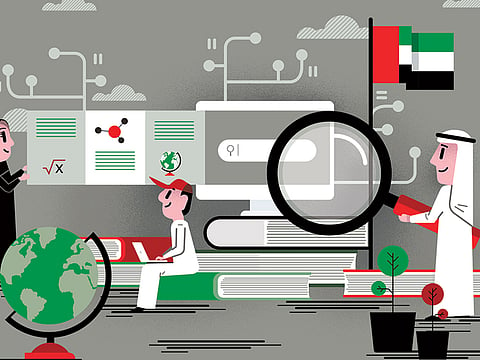A new future awaits the high school graduates of 2018
The UAE Vision 2021 and National Agenda, coupled with unprecedented technological change, will allow today’s generation to chart new, exciting career paths

As the academic year draws to an end, the 2018 class of high school graduates have to make big decisions about their future. To do that at the age of 17 or 18 is no small feat. As parents and educators, what advice should we give to our young people as they grapple with decisions that will have life-changing consequences?
These high school graduates must make their choices amid a complex and rapidly changing technological revolution. The unprecedented rate of technological change impacting business and industry removes any sense of certainty about what jobs and workplaces will look like in 20, or even 10, years from now. The professions current teenagers may be interested in pursuing may not even exist by the time they establish their career, with many of the jobs of the future not even conceived as yet. Indeed, some of today’s most common jobs will become non-existent, and many others will be automated as the science of artificial intelligence (AI) takes hold. The impact of technology replacing humans in the workforce will be felt as much here in the Middle East as in other parts of the world, with a recent study suggesting that up to 47 per cent of work in the UAE could be automated.
In the UAE, the change of pace is being driven by factors beyond the transformation caused by AI and digital innovation. With the UAE Government setting out ambitious social and economic goals in the UAE Vision 2021 and National Agenda, we are witnessing significant changes in the types of industries, and the nature of jobs in those industries. The UAE is set to become an economic and commercial capital, driven by innovation and entrepreneurship. Moving away from an economy based on natural resources to one that is driven by knowledge and innovation is a major strategic goal of the UAE Government — a goal that has implications for our high school students who are deciding on their future.
The economic and social changes fostered by technological forces and a diversifying UAE economy present enormous opportunities for the new workforce. One thing is certain: education will be key. Job seekers with advanced technical knowledge, combined with what we know as “21st Century skills”— critical thinking, social understanding, communication, resilience and adaptability — will find themselves set apart in the job market. Indeed, it is these “soft skills” that are set to become highly prized, as the changing nature of jobs will require employees to constantly update and adapt their knowledge. According to the World Economic Forum’s 2016 Future of Jobs report, by 2020, more than a third of the core skillset of most occupations will be made up of skills that are not considered crucial to the job today. Therefore, learning how to learn will be a benchmark of success, as will be the ability to apply new theory or knowledge to find solutions to complex problems.
This is where universities play a valuable role. While theory and technical requirements are very important, it is not enough for those undertaking higher education to be proficient in these areas. We must give our students the tools needed to translate their academic achievements into success in the workplace — and employers expect this of us as well. According to a recent Executive Briefing published by the World Economic Forum, “There is growing evidence of a sizeable skills mismatch in the Mena region, as young people fail to acquire the skills needed to succeed in today’s jobs, let alone tomorrow’s. Nearly 40 per cent of employers in the Mena region indicate that skills gaps are a major impediment to business growth and several countries in the region fall below the global average in the ease of finding skilled employees according to business leaders.” This skills gap can account for some of the high levels of youth unemployment observed in our region. While there is a growing number of jobs available in many of the countries in the GCC, young people nevertheless report being unable to find work or work that is befitting of their educational level. Those people under the age of 30 with a university degree are among those reporting the highest levels of unemployment or under employment.
Therefore, it is important that we look beyond providing university students with an excellent theoretical basis and show them how to apply this knowledge in the real world. Seeking new ways of matching academic knowledge with business experience, and providing students with an understanding of the real-world problems they are likely to face must be a priority. Internships for undergraduate students is one way to achieve this, providing a mutually beneficial solution for students and the organisations in which they intern; students come to understand how they can provide value in the workplace, while organisations are given access to new talent.
Young high school graduates in the UAE have a wealth of opportunities ahead of them. Not only are they graduating at a time where the Fourth Industrial Revolution is in full swing, opening up careers in new and exciting fields are set to change the way in which we all live, but they are also in a country that is rolling out one of the world’s most ambitious plans for economic transformation. By equipping themselves with an education that will serve them well in the new world, and ensuring that they have the skills that let them continue to learn and grow, today’s generation of high school graduates has the opportunity to go where no one has gone before. I look forward to welcoming some of these talented, ambitious and motivated students in the coming academic year.
Dr Jorg Bley is dean of the School of Business Administration at American University of Sharjah.


